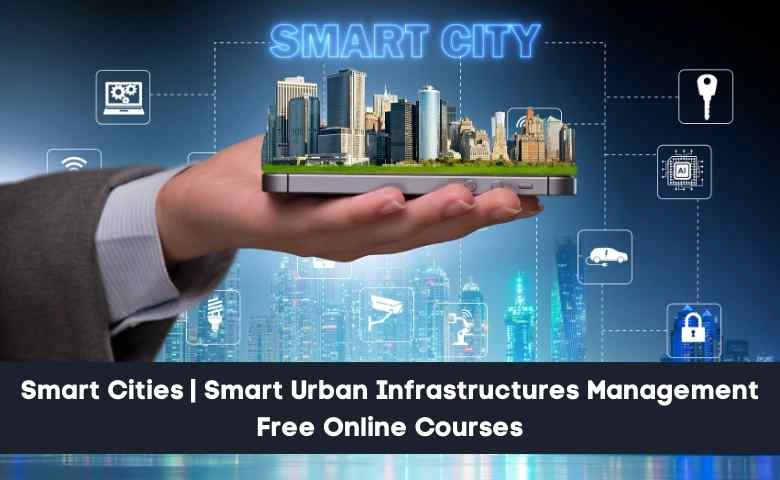Last Updated on April 4, 2024 by Admin
A smart city is an urban area that uses different types of electronic Internet of things (IoT) sensors to collect data and then use insights gained from that data to efficiently manage assets, resources, and services, in return, using that data to improve operations across the city better. Kindly check the below-mentioned free online courses to learn Smart Cities Concepts in 2021.
This includes data collected from citizens, devices, buildings, and assets that are processed and analyzed to monitor and manage traffic and transportation systems, power plants, utilities, water supply networks, waste management, crime detection, information systems, schools, libraries, hospitals, and other community services.

The smart city concept integrates information and communication technology (ICT) and various physical devices connected to the IoT network to optimize the efficiency of city operations and services and connect to citizens.
At Smart City, we empower our teams and create an environment where solutions are architected through collaboration. We’ve learned that everyone thrives when we celebrate team success, recognize innovation, and embrace individuality.
Related Posts:
- Data Science for Construction, Architecture, and Engineering | Free Online Course
- 11 Best Project Management Online Courses For 2021 Updated
- Top Free Online Courses Websites For Engineering Courses In 2021
- Top Construction Management Online Courses To Study In 2021
Career Opportunities In Smart Cities Project
Digitalization, an ambitious target barely a few years ago, has become mainstream and is moving extremely fast towards becoming the way of life. A primary example of this is the concept of smart cities, which was recently limited to grand plans but is now slowly becoming a reality.
With governments pushing towards smart cities and ushering in a new era of urban planning and development, there are high expectations regarding the job opportunities such initiatives bring.
As smart cities rely heavily on the technological amalgamation of the different services and facilities offered by the city administration, newer job roles will likely emerge apart from the traditional ones.
Employment has always been a prime concern of the population, and it is the responsibility of the government to do everything they can to encourage job growth. With the rapid increase in multiple sectors, there can be a wide variety of jobs available to an increasingly employable population, which leads to population happiness and a stable economy. Kindly check this course to master the art of site planning.
Online Courses
The following are the best five online courses to learn about smart cities’ concepts and land a job in this technology-based smart city project.
1. Smart Cities, Management of Smart Urban Infrastructures
- Course Offered By EPFL
-
Effort: 2–3 hours per week
-
Price: FREE
In the era of Smart Cities, learn the principles of urban infrastructure management, and find ways to incorporate smart technologies into legacy infrastructures.
In this course, you will gain a thorough understanding of the challenges and opportunities associated with “smart urban infrastructures,” as well as how these infrastructures can be managed to deliver desirable performance in cities.
More precisely, throughout this 5-week, you will learn about the essential principles for the management of Smart urban infrastructures and the application of these principles to two specific sectors, namely urban transportation and urban energy systems.
What you’ll learn;
Learn how data and information impact the design, sustainability, and resilience of future cities.
This architecture course will teach you the basics of information cities and urban science research and how dynamic behavior and citizen-driven learning differentiate the responsive city from the smart city. The cities we present and develop in this course use the stocks and flows of information as the main drivers of change.
To deepen your knowledge of smart cities and give a perspective on the future of these cities, we also introduce the concept of citizen design science, a combination of citizen science, urban design, and cognitive design computing.
Participants will furthermore have unique access to a design research platform for citizen design science. The intelligent use of data and information is at the core of this course, and these concepts will be the next generation of participatory design and design computing environments. Also, check this article on sustainable construction materials.
What you’ll learn;
3. Cities and the Challenge of Sustainable Development
- Course Offered By SDG Academy
-
Length: 1 Week
-
Effort: 1–2 hours per week
-
Price: FREE
What is a sustainable city? Learn the basics here.
According to the United Nations, urbanization and population growth could increase 2.5 billion people into urban populations by 2050, with associated impacts ranging from increased transportation needs to more buildings. How do we make cities sustainable to support this growth?
In this mini-series, learn the challenges of local governments to adapt to new technologies, energy systems, modes of transportation, and more to build the sustainable cities of the 21st century.
This course is for;
- Anyone new to the concept of sustainable cities or smart cities who wants to understand the foundations of modern urban development
- Graduate students and advanced undergraduate students in architecture, real estate development, sustainable development, sustainable business, and other related fields who want a concise overview of the concept of sustainable cities
- Sustainable development practitioners interested in the basics of sustainable development for cities around the world
- Private-sector actors, such as those who work in technology, telecommunications, transportation, or the energy industry – whose work can contribute to and redefine this space
What you’ll learn:


